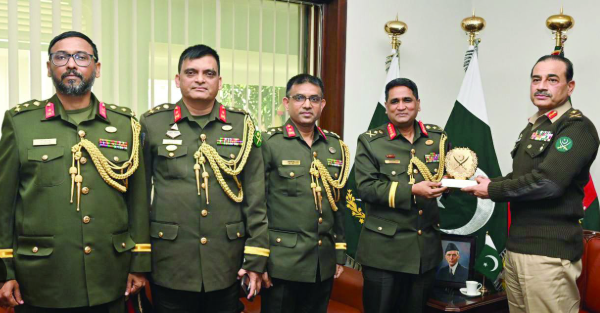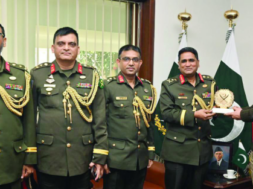
Roving Periscope: Ignoring the 1971 rapes, Bangladesh sleeps in Pakistan’s bed
Virendra Pandit
New Delhi: Bangladesh now seems to be plagued with a collective, nationwide psychological disease, schizophrenia-cum-Stockholm Syndrome, as it not only praises the perpetrator of crimes against humanity but also embraces it in an enduring brotherhood.
During the Liberation War in 1971, the Pakistani soldiers and their Razakar militia brothers, floated by Islamic extremists, raped up to 400,000 Bengali women in East Pakistan (now Bangladesh). Many of these women died in captivity, bore unwanted children, or committed suicide. Some managed to move to India.
Fifty-four years on, Bangladesh is praising the Pakistan Army for its “exceptional professionalism!”
Now, being governed by the so-called “Nobel Laureate for Peace”, Muhammed Yunus, Bangladesh has forgotten all those atrocities. The “student wings” of Jamaat-e-Islami and Hifazat-e-Islami, the real power behind his throne along with the Bangladeshi Army, are demanding that the secular country be re-Islamized and renamed as “East Pakistan.” Few now believe in Yunus’ assurance that Bangladesh will conduct parliamentary elections in 2025 or 2026; at 84, he is now a convenient political facade for the real powers in Dhaka.
So, it is no surprise that Bangladesh is now willingly sleeping with its rapist Pakistan.
Nothing proves this better than the Tuesday meeting of the two countries’ army officials, at Pakistani Army headquarters in Rawalpindi, who proclaimed that “no outsider can harm our brotherly ties.”
This much-awaited and rare high-level meeting took place in Rawalpindi, where Pakistan and Bangladesh’s militaries stressed that their ‘enduring partnership’ must ‘remain resilient against external influences,’ the media reported.
This is a fresh indication of strengthening ties between Dhaka and Islamabad after the ouster of Bangladesh Prime Minister Sheikh Hasina on August 5, 2024, in a standard Islamist uprising to overthrow a democratically-elected government.
According to the Pakistani media outlet Dawn, the two armies agreed to enhance defense cooperation and collaborate on promoting regional peace and stability, even praising one another as “two brotherly nations” united in resisting “external influences.”
Amid re-warming ties, they also emphasized their “enduring partnership” to “remain resilient against external influences.”
Reports said Lt. Gen. S.M. Kamrul Hassan, Principal Staff Officer (PSO) of Bangladesh’s armed forces division, met Pakistan’s Chief of Army Staff (COAS) General Asim Munir and Chairman of the Joint Chiefs of Staff Committee (CJCSC) General Sahir Shamshad Mirza at the Pakistan Army’s headquarters in Rawalpindi, Islamabad, on Tuesday.
Their conversations centered on emerging security challenges and enhancing bilateral military cooperation, the report said, citing a statement from the Inter-Services Public Relations (ISPR), the media arm of the Pakistan Army.
They agreed to undertake joint efforts to address regional security dynamics. “The COAS and the PSO underscored the importance of a stronger defense relationship, emphasizing that the enduring partnership between the two brotherly nations must remain resilient against external influences,” the ISPR stated.
They also discussed joint defense initiatives, including counter-terrorism efforts and intelligence sharing, and reaffirmed their commitment to fostering peace and stability in South Asia.
Pakistan Army Chief Gen Munir stressed the importance of collaborative efforts to promote peace and stability in South Asia and the wider region and reiterated that these would help both nations contribute meaningfully to regional security through strengthened defense cooperation.
Lt. Gen. Hassan, who leads Bangladesh’s armed forces division, emphasized the significance of building mutual trust and enhancing military ties. He also applauded the Pakistan Army for its “exceptional professionalism” and acknowledged the “immense sacrifices” made by its armed forces in combating terrorism, describing their efforts as a “beacon of courage and determination.”
The ISPR noted that Lt. Gen. Hassan had earlier met CJCSC Gen. Mirza at Pakistan’s Joint Staff Headquarters. They focused on mutual strategic interests and explored ways to enhance bilateral defense cooperation between the two countries.
“Both sides emphasized the importance of strengthening military ties and reaffirmed their commitment to insulating this partnership from any external disruptions,” the ISPR noted, adding that both leaders agreed on the “critical need for continued collaboration” to advance regional peace, security, and stability.
The CJCSC reiterated that the two nations shared a “common vision for a secure and prosperous future,” rooted in robust defense collaboration.
Lt. Gen. Hassan’s visit, a significant step towards normalization, renewed ties between the two nations, which remained strained by historical grievances from Bangladesh’s 1971 independence.














